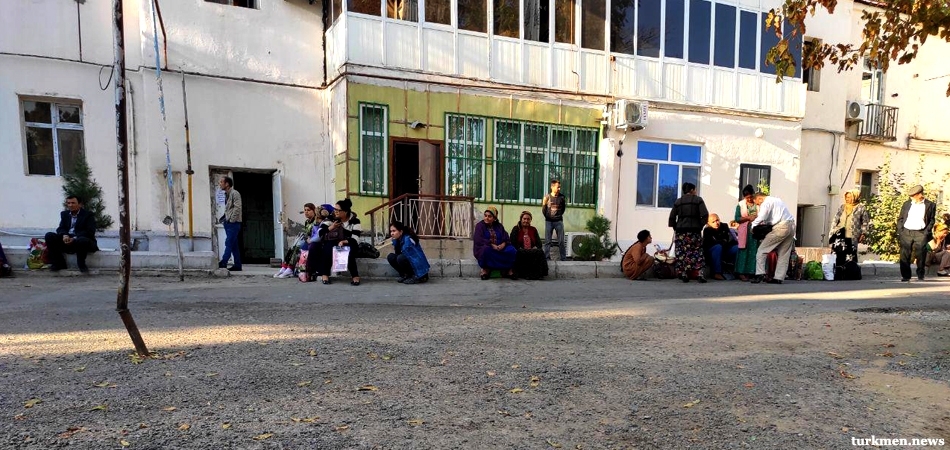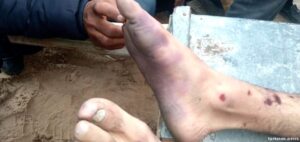
Beyond the Marble Facades. Where Are All Gokdepe’s men?
01.11.2019
No. 50A Gorogly Street has become one of the most popular destinations for Ashgabat’s taxi drivers. It is the address of the embassy of Uzbekistan. Early every morning hundreds of people stand outside the embassy, waiting to submit their application for a visa or to receive an already prepared sticker. And these are just the applicants who come in person – the vast majority of would-be foreign travellers use the services of a travel agency. In January to June 2019 more than 233,000 citizens of Turkmenistan visited neighboring Uzbekistan. The main purpose of their trips is to sell consumer goods and to withdraw cash from local ATMs. Turkmenistan’s migration service and the State Bank for Foreign Economic Affairs of Turkmenistan are imposing new restrictions in an attempt to stem the flood of “currency tourists.” Turkmen.news correspondent Azat Hatamov reports.

“I bet that’s not what they do abroad in order to get to Turkmenistan, kill one another!” says a Turkmen man, watching people swearing at each other over a place in line two hours before the embassy opens. “We’re barbarians. They call us sheep and we even get offended.”
By seven in the morning there are already over 250 names on the list, but people keep on coming. There are old men with walking sticks, and small children. Verbal altercations break out here and there. People are disgruntled because there are two lists and people who signed up yesterday are first to go in.
“But the embassy wasn’t open yesterday, so how could they have signed up?” a young woman asks crossly. She’s one of several women sitting on the curb outside the embassy gates while they wait for it to open. They think that the young man compiling the list, who sports a tracksuit top with RUSSIA emblazoned on the back, is putting people at the top of the list because he knows them or maybe for money. The women say there are people on the list who sell their place in line for money. For 40 to 50 manats (around $2.5) one can jump from 150th place on the list to fifth.
The majority of people waiting are from Lebap and Dashoguz regions in the east and northeast; they are easy to identify by their dialects and frequent use of Uzbek words. But there are native Ashgabat residents too for whom a trip to Uzbekistan has become their sole source of income.
“There’s no proper work in the city, and what is available pays up to 700 manats a month [around $37]. Who can live in Ashgabat on that kind of money today?” asks city resident Shirberdy.

The man is applying for a multi-entry visa for 20 days and is going to Uzbekistan to withdraw cash with Turkmen bank cards – his own and the cards of friends, and friends of friends. He will supposedly go shopping in the local stores as well, paying for his “purchases” with his card, while in fact he will receive hard currency from the shop assistant minus the assistant’s percentage. For 50 dollars paid by card, the “shopper” usually receives 40 to 45 dollars in cash.
People come up to him themselves and give him their cards and PIN codes for each one. For 100 to 150 manats he brings dollars to people in Turkmenistan, which they then exchange at the bazaar at the market rate. For every dollar withdrawn the Turkmen bank takes 3.5 manats from people’s cards – that’s the official rate, while the money changers at the bazaar give around 19 manats per dollar. For the entire period of validity of his visa Shirberdy will manage to make approximately five trips to Uzbekistan. The money he makes will cover the cost of his visa and travel, with enough left over to live on for a week. Shirberdy has been involved in this business for a year already.
“I know dozens of people who make a living this way,” he says. “What can we do? There’s a crisis! People have been put in this situation, and they have to get by however they can.”
Far from all the hard currency tourists are out of work like Shirberdy. Many are public sector workers, who go to Uzbekistan to make some extra cash on their day off or at the weekend. One such person is Rozymbay, a worker at the Dashoguztransgas enterprise. He says it will probably be his last visa, as each time the trip brings in less money.
“At the end of October I was in Shavat [a settlement in Uzbekistan near the border with Turkmenistan – turkmen.news], and couldn’t pay a single sum through a terminal all day, though in the summer I could regularly pay 45-50 dollars,” he says. “I came back home with just $10 in my pocket. That was all I could get out of the ATM.”
Rozymbay hopes that these problems are just temporary – this has happened before so he’ll give it one more go. However, other people’s stories make him think that the racket will soon be closed for good.
“My colleague got a visa through a travel agency, but when we went to the border check point together, he was suddenly asked to show his travel arrangements,” Rozymbay says. “No one has ever been asked for them before, no one has ever taken them with them on their trip. They’ve got a visa and that’s it, but now it’s ‘please show your tourist papers!’”
In the end his colleague wasn’t let through. He said that around 20 people returned to the city with him for the same reason.
The authorities don’t like people showing this entrepreneurial initiative. Over the past three years the bank has introduced various restrictions for the population, each time reducing the sum that can be withdrawn abroad. Then they started checking passports in the bank: was the client really abroad on the day that money was withdrawn from their card? And if there were no border stamps then the client would have their card blocked for life. These checks come in waves, and people at the embassy say that the latest wave is happening now.
Citizens cannot understand the behavior of the migration service and the bank. And it angers them, as they have to take any chance to make a living in conditions of high unemployment and inflation in food and goods prices. Painters and decorators who refurbished houses and apartments during the summer months, brick makers, tandoor oven builders, and other craftsmen have now swelled the ranks of the unemployed in Dashoguz, Rozymbay says. For many people the only option left is to go and work in Turkey.
Turkey is a sore point for my first interviewee, Shirberdy. He could not get the promised work as manager of a villa with a monthly salary of $700, and was ashamed to return home penniless. He worked for a month in a textile factory, getting paid $6 an hour for 10-12 hour shifts. He paid for his room in an apartment, repaid his debts, and bought a plane ticket home to Ashgabat. He said he’s inhaled enough textile dust to last him a lifetime.
“It’s OK for bachelors to work in Turkey, but I’ve a son who is growing up,” he says. “A teenager without his father can end up making the wrong choices in life, and if you start to criticize him for it, he’ll have every reason to say, ‘But where were you all this time, Dad?’”

Meanwhile, local people have found a way to make money right there near the embassy. A hundred meters from the building at a small window in a private house a Russian family is helping people fill in the visa application form in what is a foreign language for Turkmen, all for a modest sum. Sometimes people cannot write their name and surname properly, don’t know where to write their passport number and where to write its expiry date. Judging from the number of people asking for help, the family has a pretty good income. Shirberdy was right when he said, ‘What can we do? There’s a crisis!’
P.S. While this article was being finalized for publication, turkmen.news sources in Dashoguz and Lebap reported a noticeable fall in the number of people crossing the border. This might be linked with the bank’s new restrictions, or with the arrival of the cold weather. Uzbekistan’s State Committee for Statistics will soon publish new data about border crossings. The Turkmen authorities, however, do not reveal such information.

Upmarket Bar in Ashgabat Closed After Brawls Involving President’s Cousins
08.04.2024

Petrofac Back in Favour in Turkmenistan After Falling Foul of Berdimuhamedov
18.03.2024

Turkmenistan’s Defense Minister Deprived Officers From Housing Entitlement Despite Widespread Resignations
28.02.2024

Murder and Suicide at Troubled Turkmen School
28.02.2024

Turkmen Prosecutor’s Office Claims Baloch Detainee’s Fatal Wounds Were Self-Inflicted
01.02.2024
Tell us!
Add comment
your e-mail will not be published